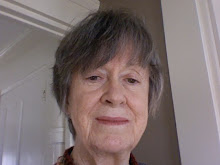Sermon for Pentecost 2008. As written, but not as delivered.
“Grace dances. I would pipe. Dance ye all.”That’s written at the beginning of a poem written by W H Auden called Whitsunday in Kirchstetten. Whitsunday (or White Sunday) is one of the great feasts of the church. The white is from the white baptismal clothes the newly baptized would wear. I’m sure the poem came to mind because of my upcoming trip to Vienna. I never went to the town of Kirchstetten, I’ve only seen the town sign while going past it on the train. I do like its invitation to celebrate the gift of the Holy Spirit.
Grace Dances
We don’t do much dancing in our Episcopal Church services. There is one Episcopal church that I know in San Francisco where everyone dances and that is St Gregory of Nyssa. Not only do they dance around the altar, but they have ninety larger than life saints dancing in a circle over their heads. Ninety people from various ages and religious traditions, dancing around the rotunda with a twelve-foot high dancing Christ.
I would pipe. (Play Hymn 554 on the recorder)
This good Shaker tune we sometimes sing as Lord of the Dance is a tune called “Simple Gifts” invites us to dance. In fact, when Bishop Lane came last year, Pam Ellis led our young women in a liturgical dance while we sang it.
Dance ye all.
How do we dance. Well, however we do it movement is involved. In Medieval times in Italy they’d throw rose petals down on parishioners to represent the tongues of fire and in France they’d blow trumpets to represent the great wind, and for what ever reason in England they’d have horse races. A pretty far cry from the tame way we do church today.
In the opening stanza, of the poem, Auden is in the Kirchstetten Roman Catholic Church and hears the noise of cars exiting Vienna, or to use his own words: “outside, car worshippers enact their ritual exodus.” We know of the ritual exodus, especially in this town which is a resort destination. People frequently come for the weekend. Sometimes they join us at our service, and if you are one of those, you are most welcome, but most often we see the line of cars coming up the mountain on Friday, then on the main street, and finally going down the mountain on Sundays. People dance with their feet, literally or figuratively and it isn’t always into the doors of our churches.
Auden speaks of being “well gruss-gotted” That’s a custom we Americans don’t seem to have. If you go into any small town in Austria, or if you are walking in the Vienna Woods, everyone you encounter will say “gruss gott.” It means something like God’s greetings. Something like the Spanish, Vaya con dios, except that’s usually used for good byes. Our passing the peace is a gruss gott moment. I would hope that everyone here, friend and stranger alike will feel well grus gotted by the time they leave.
It is nice to see familiar faces returning for the summer. It seemed to me that this past winter saw a real decline in our numbers. We are loosing people because of illness and death, and it seems like few new people are joining. And it’s not just Good Shepherd that is struggling, a lot of churches seem to be struggling with how we need to be church in our own time. Horse racing and falling rose petals and blowing trumpets aside, people who are concerned about the declining relevance of church in our society are looking what the upcoming generations are looking for and what they’re seeing isn’t what either we mainline churches or the traditional evangelical churches are about. They call this the Emerging Church and the people in it “emergents” Anglicans call it Anglimergent.
So let me tell you some of what they’ve found out. This is from an article on Alternet by The Rev. Howard Bess. I have modified some of his words a bit.
First of all, emergents can’t accept the idea of Bible inerrancy (meaning it contains no errors). That concept does not stand modern critical examination in the study of languages. To say that ancient documents written in the Hebrew and Greek used thousands of years ago contain no errors is not credible.
Then, emergents ask: "If we are followers of Jesus, why don’t we live and preach Jesus’ message?" They want a more radical Christianity than they find in either the Evangelical or mainline churches. More and more they are putting their primary attention to what Jesus said and did.
Third, exposure to science in public education, universities and personal studies has led emergents to disagree with the idea that when the Bible and science appear to collide, science must take a back seat to the Bible. The emergents are not abandoning the Bible, but are raising critical questions about the Bible's nature and content. This new breed of Christian remains quite committed to the Bible but they are very open to new ideas and understandings.
Fourth, emergents have become disillusioned by the clay feet of church leadership. It is not just the Jim Bakkers and the Jimmy Swaggarts, but the rank and file of church leadership. Emergents compare what Jesus had in mind and what is going on in churches, and they see a need to start over. They want a fresh start with serious intent to follow Jesus.
Fifth, our public schools and our nation in general are insisting that we be truly multicultural. The churches' teaching, that people not like us, are doomed, is not acceptable to emergents. They want a much broader definition of what it means to be accepted in the family of God.
Sixth, emergents are insisting that God be understood as totally gracious and loving. The angry, vengeful God that is sometime presented in both Old and New Testaments is not acceptable.
Seventh, acceptance of homosexuals in the family of God is common. Being pro-gay or anti-gay is not the issue. Emergents recognize that sexuality is far more complex than is generally recognized. To live in harmony with gay and lesbian friends and family members is a part of the emergent's perspective.
Eighth, echoing the first named characteristic, emergents recognize the role that language plays in their understanding and practice of the Christian Faith. Theology is both language bound and culturally shaped. To be rigidly exclusive does not make sense to emergent Christians.
This is a dance that is leading the church into new and scary paths. It’s as though the Holy Spirit is again blowing wind and dropping fire on new heads. I don’t know how or if Good Shepherd will become part of the Anglimergent movement. I do know that soon you will be starting a new phase of your own. The gift of the Holy Spirit takes many forms, but whatever form it does take it is grace.: pure unmerited grace.. We certainly don’t deserve ti, but we get it anyway. Look at what happened to the disciples. They were gathered all together when the great rushing wind of the Spirit came and filled those men of Galilee with the ability to speak God’s word so that it could be heard in the hearer’s native language.
And to end with the last line of Auden’s poem: “what do I know, except what everyone knows- if there when Grace dances, I should dance.”

















